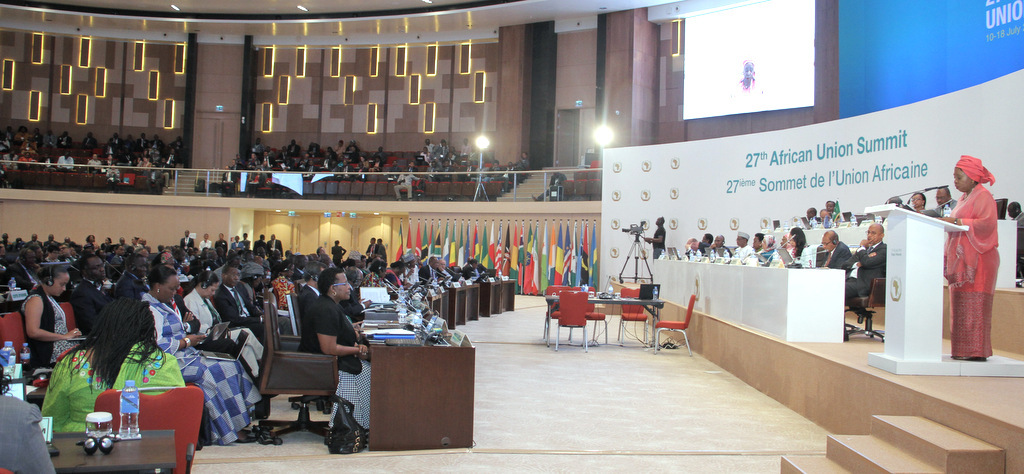
South Sudan crisis a burning issue as Session of the Executive Council opens in Kigali
The 29th Ordinary Session of the Executive Council Kicked off on Wednesday at the Kigali Convention Centre with the African Union Commission Chairperson Dr Dlamini Zuma condoling with people of South Sudan while reiterating AU’s commitment to continue to support peace efforts in the continent.
“It is with grave concern that we start this Council, as over the past few days we see the resurgence of the conflict in South Sudan, after more than two years of talks. Hardly two months after the formation of the Government of National Unity, the belligerents seem to back in the trenches, and the people of South Sudan, instead of celebrating five years of independence, once again are barricaded in their homes or must flee like sheep before the wolves,” said Zuma.
 Rwanda’s Foreign Minister Louise Mushikiwabo welcomed those attending the session stating how special it is for the east African nation to hold the Summit.
Rwanda’s Foreign Minister Louise Mushikiwabo welcomed those attending the session stating how special it is for the east African nation to hold the Summit.
“The 27th AU Summit to be hosted here is really special for us as Rwanda. We’re pleased to have you all. Those who will stay longer beyond the summit will explore the country beyond Kigali,” she said. “We welcome you as our dear brothers & sisters from across the continent. Feel at home in Rwanda.”
The AUC Chairperson also welcomed the Ministers to the meeting and conveyed a special welcome to all the new members who joined the Executive Council for the first time.
 Dr Zuma quoted in her opening remarks one of the Founding members of the Organization of African Unity (OAU), the Pan-Africanist Kwameh Nkrumah by saying,” “If we are to remain free, if we are to enjoy the full benefit of Africa’s resources, we must be united to plan for our total defense and the full exploitation of our material and human means in the full interest of all our people. To go it alone will limit our horizons, curtail our expectations and threaten our liberty.”
Dr Zuma quoted in her opening remarks one of the Founding members of the Organization of African Unity (OAU), the Pan-Africanist Kwameh Nkrumah by saying,” “If we are to remain free, if we are to enjoy the full benefit of Africa’s resources, we must be united to plan for our total defense and the full exploitation of our material and human means in the full interest of all our people. To go it alone will limit our horizons, curtail our expectations and threaten our liberty.”
She commended people of Rwanda for their warm welcome and also noted how the City of Kigali is a testimony of how African cities can become hubs of transformation.
The outgoing chairperson expressed the need for African nations to focus on priority areas like agriculture to be able to achieve Agenda 2063.
“Many of these actions occupied our minds during this period: such as the need for an African Commodities Strategy, to consolidate and rapidly expand the small gains in beneficiation, including critical sectors such as agro-processing as we work to eliminate hunger,” she said.
She added that, without a relentless focus on value addition and manufacturing, Africa will fail to create the jobs needed to absorb the millions of young men and women joining its labour markets each year to reap the demographic dividend of a young growing population. AUC Chairperson further urged the Executive Council to fully implement the outcomes of the Bahir Dar Ministerial Retreat of 2014. “The dream of an Africa that is integrated, peaceful and prosperous is achievable, provided that we construct this future, based on actions taken now.”
 The UN Under-Secretary-General and Executive Secretary, ECA Mr. Carlos Lopes underscored the need for Africa to have a well thought out and justified approach to the issue of migration. Mr. Lopez stressed that most Africans who migrate do so to other Africa countries. The continent has the highest intra-continent migration levels in the entire world.
The UN Under-Secretary-General and Executive Secretary, ECA Mr. Carlos Lopes underscored the need for Africa to have a well thought out and justified approach to the issue of migration. Mr. Lopez stressed that most Africans who migrate do so to other Africa countries. The continent has the highest intra-continent migration levels in the entire world.
 Moussa Faki Mahamat, Foreign Minister of the Republic of Chad and Chairperson of the Executive Council outlined the activities and agenda of the Executive Council which includes; Consideration of the report of funding of the Africa Union, Peace and security with South Sudan as a burning issue, report from PRC on budget of 2017, the case of Hissene Habir and International Criminal Court (ICC) and the Election of four (4) Judges of the African Court of Human and People’s Rights.
Moussa Faki Mahamat, Foreign Minister of the Republic of Chad and Chairperson of the Executive Council outlined the activities and agenda of the Executive Council which includes; Consideration of the report of funding of the Africa Union, Peace and security with South Sudan as a burning issue, report from PRC on budget of 2017, the case of Hissene Habir and International Criminal Court (ICC) and the Election of four (4) Judges of the African Court of Human and People’s Rights.
Upon concluding his remarks, he declared the 29th Ordinary Session of the Executive Council officially open.







